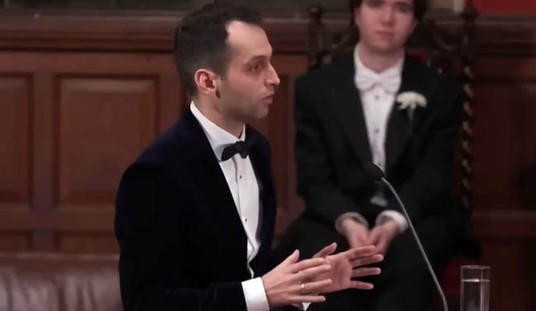I’m not sure which is worse: the suggestion that even the easiest kind of entitlement reform won’t get any hearing in the Senate this session, or the idea that Harry Reid will still be in the Senate in 2031. In an appearance last night on MSNBC, Larry O’Donnell asks a good question of Reid about the solvency of the Social Security fund and the need for reform. Reid literally waves it off and says wake him up when the meltdown is in full swing:
Give O’Donnell some credit for both asking the question at all and framing it properly. He gives a fairly objective description of the problem and the parameters that reform will have to follow. Either we raise the retirement age, which would also help with Medicare reform, or we start cutting benefits. Reid’s answer is that he won’t do anything for the next 20 years until the singularity approacheth, or something.
Why take action now, if the “solvency” of Social Security won’t be at issue until 2037? In the first place, that’s debatable in and of itself. The SSA has slipped into red ink on a monthly basis six years earlier than projected by Peter Orszag in 2008, when he ran the Congressional Budget Office, which means that the extended projections are certainly questionable. The “fund” has no cash on hand, either; it consists of Treasuries that SSA received so Congress could spend the money over the last few decades. When SSA starts cashing those Treasuries, as it has to do now to cover monthly deficits, the federal government has to sell more bonds to cover the cost.
Even if one accepts the solvency argument, reform earlier means a lot less pain later, and a better chance at holding benefit cuts to a minimum, especially for those already on Social Security. Chuck Blahous explained it in his book, Social Security: The Unfinished Work (Kindle link here), with this warning on the costs of delay:
Another notable aspect of the Social Security challenge is the cost of continued delay in repairing program finances. The longer that we put off dealing with Social Security, the less fair the solution will be.
We could, hypothetically, make the system permanently sustainable today without raising Social Security taxes in any way, without changing benefits for those now in retirement, and while still allowing future retirees to receive benefits that are higher than those paid today even after adjusting for inflation. That is, benefits could grow smoothly on a path that rises consistently in real terms, without raising taxes.
Within just a few years, however, that will no longer be true. Within about a decade, a Social Security solution would require a choice among raising taxes, reducing benefits for those already in retirement, and/or forcing future retirees to receive lower benefits than previous retirees received. Either we’d need to tell young Americans that their taxes are going up or we’d need to start telling retirees that their standards of living are going down.
If we run this thought experiment all the way out to 2037, we see that we would then face a choice of suddenly reducing benefits by 24 percent, increasing taxes by 31 percent, or some equally disagreeable point between those poles. Moreover, even this array of choices assumes that we’d be willing to suddenly cut a retiree’s benefit from $2,000 in one month to $1,520 the next— hardly likely. If instead we wanted to shield then- current retirees from sudden cuts, we could only get a comparable amount of savings by cutting the entirety of benefits for new retirees.
Whether we define the “problem” as occurring in 2016 or 2037 thus matters little to the question of whether we should act soon. Either way, a solution enacted today will be far fairer across generations, and involve far less concentrated pain, than one enacted ten or even five years from now. As we delay for reasons of political expediency, the ironic consequence is that the political difficulties of reforming Social Security only mount.
Why is delay so costly? There are a number of reasons, one of which I just touched upon: the bipartisan political consensus that we shouldn’t cut benefits for those now in retirement or about to retire. Thus, every year that passes, another class of retirees joins the rolls with benefit obligations locked in as politically inviolate.
Moreover, due to the wage- indexing of the benefit formula, each year’s delay means that we’re also locking in a greater base benefit level. This makes it less and less possible to avoid future declines in real benefit levels without raising tax burdens. In practical effect, delay inevitably exacerbates the tax increases that we will oblige young Americans to accept.
Perhaps the easiest way to understand the consequences of delay is to note that each year that we fail to act, we take another cohort of Americans— specifically, a historically large class of baby boomer retirees— out of the solution process. This means that the burden of filling the Social Security shortfall must be borne by a shrinking fraction of the population. Further concentrating the sacrifice on younger Americans is particularly unfair given that these generations already stand to lose money, net, through Social Security as it is.
Why is that? Because they’re funding the preceding generations, and the succeeding generations won’t be sufficient to fund their retirements:
The table also shows, however, that those already in Social Security will, in the future, get back $18.7 trillion (in present-value dollars) more than they will contribute henceforth. In short, their past excess contributions, even if they had been saved, are nowhere near the amount needed to pay for their future benefits.
This is where young and future generations come in. Social Security is a pay- as- you- go system: each generation’s benefits are paid primarily by taxing those that follow (this is true even if we adopt the controversial viewpoint that the $2.4 trillion Trust Fund is effective pre- funding). Were we to exclude current program participants from the solution, those just entering Social Security now will effectively be asked to put an additional $16.3 trillion into the system beyond what they will ever receive.
Waiting two decades to wake up Harry Reid isn’t a policy. It’s a pusillanimous political dodge, and it threatens the fiscal health of the United States. If Harry Reid can’t stay awake and do his job for the next twenty years, then he needs to resign so Nevada can find a Senator with intestinal fortitude who can handle the job.









Join the conversation as a VIP Member